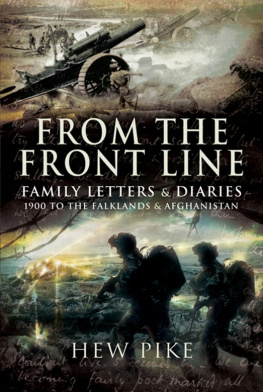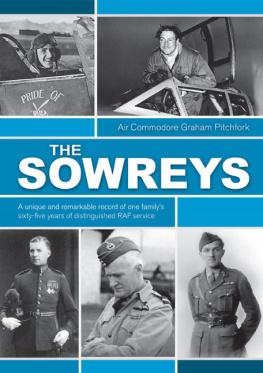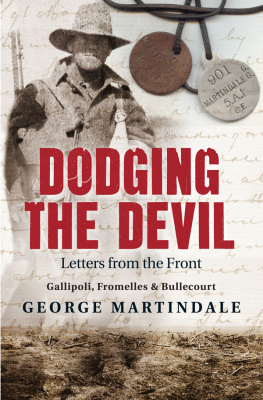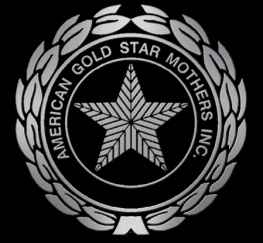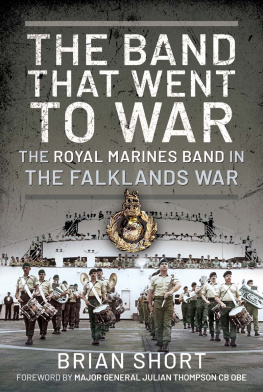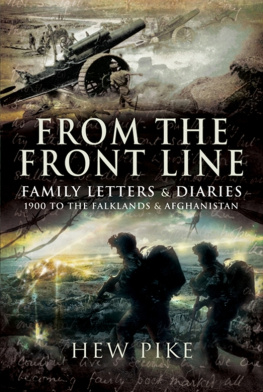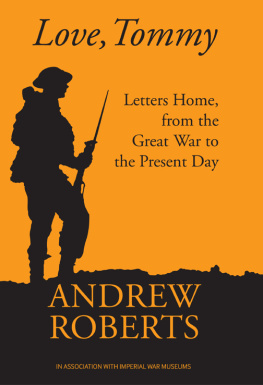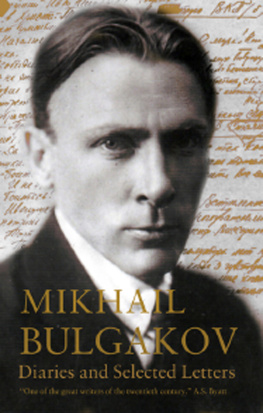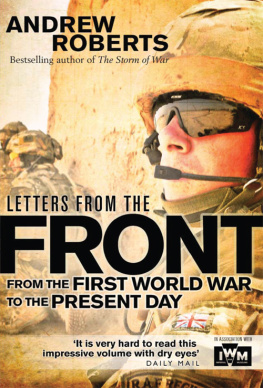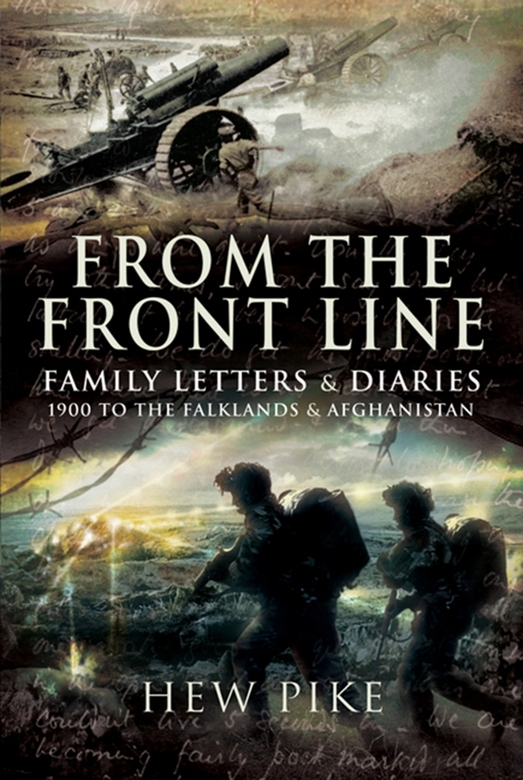Epilogue
Most wars can be blamed on the fallibility of mans judgement one way or another, though often there are evil elements at work, creating difficulties which simply cannot be overcome without recourse to fighting. Whilst force should always be the last resort, therefore, it can sometimes prove necessary, although even in these cases, with the wonderful gift of hindsight we can see where things might have been handled differently, especially in the months or years before the stone begins to roll towards conflict. When we look at the spectrum of wars experienced by my family in this book, some wars, like the South African War, were justified at the time by the demands of Empire, and although controversial even then, are now viewed more critically still. The same can be said in a minor key about such operations as the Aro Expedition and, much later, the Radfan both colonial-style punitive raids of a kind. Other wars, like the Second World War and Korea were clearly justified on grounds both of International Law and moral rectitude. And whatever the diplomatic misunderstandings and mistakes that preceded it, the same can be said of the Falklands War. For despite the sad loss of 255 British and possibly as many as 700 Argentine lives, in addition to the hundreds who were wounded, the conflict emphatically left the Falkland Islands, Britain and Argentina better places. The First World War remains more problematic, so that one can only sensibly observe that at the time, few participants other than pacifists, or those like the poets Siegfried Sassoon and Wilfred Owen, haunted by their own terrible experiences, doubted that this dreadful catastrophe must be seen through to the end. I am certain that the likes of Reggie, Bridgy, Frank and Cuthbert felt this way.
The wars of the twenty-first century seem to be posing challenges as much to do with governance and reconstruction as with tactical military actions, having about them also a moral and political ambivalence that just makes the job of the soldier even more difficult, but no less dangerous. Wills account of the rapid descent into fighting in Afghanistan in the summer of 2006 thus highlights the extent to which the military role is only one part of a broader strategy, demanding an equal or greater commitment of civil and economic resources, if success is to be delivered. As Paddy Ashdown put it in a recent commentary, Breaking up the Taliban by winning over the moderates is a far better route to success than bombing and body counts.
And so we come to the soldiers, who leave their families to go off and do the nations business, sometimes mighty unpleasant and poorly rewarded business, too. Few of them are heroes in the hackneyed headline sense, but most of them do their duty by their comrades and in this sense vindicate the words of St Johns Gospel: Greater love hath no man than this, that a man lay down his life for his friends. Most of those who do sacrifice their lives, do so as part of a close-knit team, in which each man relies on the support of the others and each understands that they must risk their lives if the team is to prevail. In this sense, duty and sacrifice become synonymous. Never did I think the valour of simple men could be so compelling, writes Thomas Little of the Dublin Fusiliers from the Somme in 1916. I have chosen to stay with my comrades. I am calm and happy and desperately anxious to live. Nor can the frequency of accident and mischance be forgotten in this province of uncertainty, as von Clausewitz describes war, where men and women so often lose their lives in circumstances that seem to contribute nothing whatever to the cause of success Hew Tompsons death being a prime example of this; Goldie, one of Reggies comrades on the Aro Expedition, killed in an accident on the Western front, being another.
Kipling famously recognized the publics and Governments historic neglect of soldiers in the piping days of peace Its Tommy this, an Tommy that, an Tommy go away, But its Thank you, Mister Atkins when the band begins to play; and Winston Churchill also understood these dangers, writing of the Army:
If it is bullied, it sulks;
If it is unhappy, it pines;
If it is harried, it gets feverish:
If it is sufficiently disturbed, it will wither and dwindle and almost die;
And when it comes to the last, serious condition, it is only revived by
lots of time and lots of money.
All this rings true today, of course, and it is cold comfort to be reminded that there is nothing new in it. Reggies speech in 1934 at Merton College about the surgeon and the rusty table knife perfectly makes the point about the resources needed by soldiers, that are so often missing. Wills company arrive in Helmand in 2006 still highly vulnerable to Improvised Explosive Devices (IEDs), and are issued with some equipment for the first time, despite their intensive pre-deployment training in Oman. Their flexibility and responsiveness is also critically constrained by the lack of helicopters. Early in his political life in the 1850s, Lord Salisbury wrote in the Saturday Review about the way the Army was looked upon as a sort of luxury, like a private gentlemans carriage, which is naturally put down when times are bad. Equally timeless is his response as Prime Minister in 1885 to a request from General Sir Frederick Roberts for an increase in the size of the British garrison in India so that Kandahar could be recaptured and Herat secured against the Russian threat as soon as possible. Our people require to have it driven into their heads, he wrote, that if they will not submit to a conscription they must submit to a corresponding limitation of their exploits. For our people read democratically elected British governments in the early twenty-first century, who are so markedly failing to balance military resources with commitments.
And what, finally, of the families of our under-resourced and over-committed soldiers? Warfare is, of course, timeless in this respect, too. Timeless in terms of the partings and the constant anxieties, and timeless in terms of the strong desire to communicate, these days made almost too easy and immediate, so that the letters that say so much about person and place have now largely given way to the urgent immediacy and shorthand of the e-mail, the text message and the mobile telephone. Timeless, too, are those terrible moments when the news arrives of death or serious injury, and the grieving that follows. Yet with the grieving should come pride; pride that an example of courage, discipline and a strong sense of duty to comrades and friends have been shown, and can never die. After the Falklands, we travelled the country visiting the families of those who had been killed, and every household we went to reflected this pride; pride in the remembrance of past ambitions and achievements at school, on the sports field or in the Army. Every member of the family seemed to be in the Regiment too, rooting for their own particular anxiety, in Bridgys words, marching with him, cheering him on to the end. And naturally they all had a picture in pride of place, just like Hew Tompsons on our own table at home.
A nation is not merely a place where we happen to be. A nation is also a narrative of which we are a part. Society is a contract between the dead, the living and those not yet born.
Oh dear, what comfort can I find? writes Rudyard Kipling of his son Jack, missing at the Battle of Loos in 1915:
None this tide,
Nor any tide,
Except he did not shame his kind
Not even with that wind blowing and that tide.
Then hold your head up all the more,
This tide

